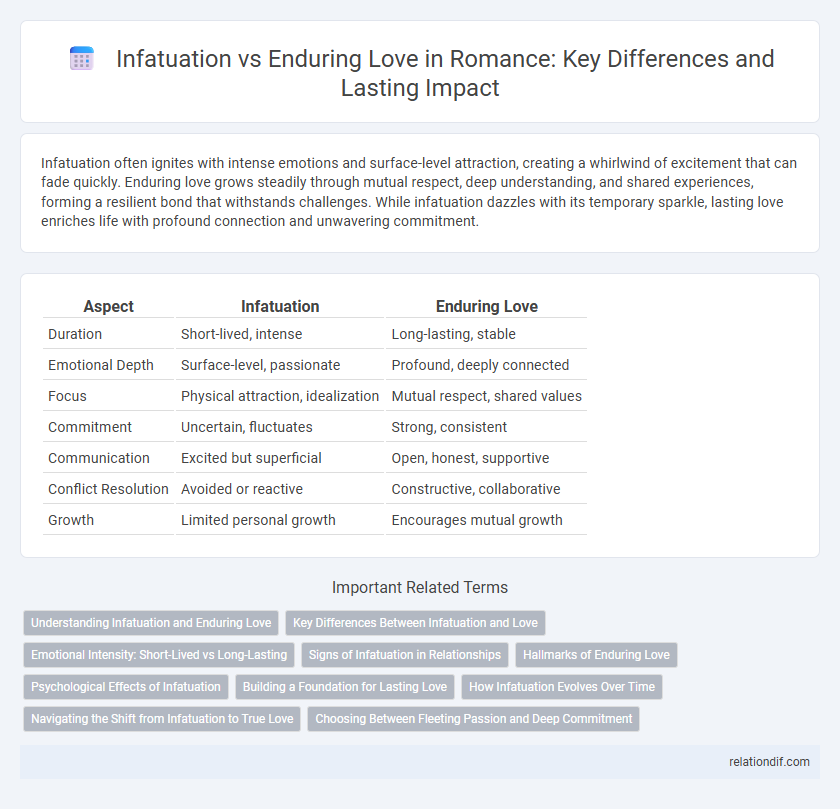Infatuation often ignites with intense emotions and surface-level attraction, creating a whirlwind of excitement that can fade quickly. Enduring love grows steadily through mutual respect, deep understanding, and shared experiences, forming a resilient bond that withstands challenges. While infatuation dazzles with its temporary sparkle, lasting love enriches life with profound connection and unwavering commitment.
Table of Comparison
| Aspect | Infatuation | Enduring Love |
|---|---|---|
| Duration | Short-lived, intense | Long-lasting, stable |
| Emotional Depth | Surface-level, passionate | Profound, deeply connected |
| Focus | Physical attraction, idealization | Mutual respect, shared values |
| Commitment | Uncertain, fluctuates | Strong, consistent |
| Communication | Excited but superficial | Open, honest, supportive |
| Conflict Resolution | Avoided or reactive | Constructive, collaborative |
| Growth | Limited personal growth | Encourages mutual growth |
Understanding Infatuation and Enduring Love
Infatuation often manifests as an intense but short-lived passion driven by idealized perceptions and emotional arousal, lacking deep knowledge of the other's character. Enduring love, by contrast, is characterized by mutual respect, trust, and commitment, developing through shared experiences and acceptance of imperfections. Understanding infatuation helps distinguish fleeting attraction from the foundation required for lasting, meaningful relationships.
Key Differences Between Infatuation and Love
Infatuation is characterized by intense, short-lived attraction often driven by physical appearance and idealization, while enduring love is marked by deep emotional connection, trust, and commitment that grows over time. Infatuation tends to be impulsive and emotionally volatile, whereas enduring love involves patience, understanding, and acceptance of flaws. Key differences include the sustainability of feelings, the depth of interpersonal knowledge, and the presence of mutual support in lasting relationships compared to the superficiality of infatuation.
Emotional Intensity: Short-Lived vs Long-Lasting
Infatuation ignites intense emotional highs that often fade quickly, driven by physical attraction and idealized perceptions. Enduring love cultivates deep emotional connection and trust, sustaining a steady, profound intensity over time. The contrast lies in infatuation's fleeting passion versus long-lasting love's resilient emotional bond.
Signs of Infatuation in Relationships
Signs of infatuation in relationships often include intense, short-lived passion characterized by obsessive thoughts and idealization of the partner, usually lacking depth and mutual understanding. Physical attraction and excitement frequently overshadow emotional connection, leading to impulsive decisions without considering long-term compatibility. This phase may involve heightened anxiety about the partner's approval and a tendency to overlook flaws, contrasting with the stability and trust found in enduring love.
Hallmarks of Enduring Love
Enduring love is characterized by deep trust, mutual respect, and consistent emotional support, forming a resilient foundation beyond initial infatuation. It thrives on shared experiences, effective communication, and a commitment to growth together, contrasting with the fleeting intensity of infatuation. Hallmarks such as patience, forgiveness, and unconditional acceptance distinguish enduring love from the transient excitement found in early romantic attraction.
Psychological Effects of Infatuation
Infatuation triggers intense, often irrational emotional highs due to elevated dopamine and adrenaline levels, leading to obsession and idealization of the romantic interest. This psychological state can cause impaired judgment, heightened anxiety, and mood swings as individuals struggle to reconcile fantasy with reality. Over time, the initial euphoria of infatuation typically gives way to either deeper emotional connection or disillusionment, influencing long-term relationship stability.
Building a Foundation for Lasting Love
Building a foundation for lasting love requires more than fleeting infatuation; it demands trust, communication, and mutual respect. While infatuation is often characterized by intense but temporary feelings, enduring love grows through shared experiences and emotional resilience. Prioritizing emotional intimacy and consistent support creates a stable bond that withstands challenges over time.
How Infatuation Evolves Over Time
Infatuation often begins with intense attraction and idealized perceptions, driving strong emotional and physical responses that can feel overwhelming. Over time, this initial passion may either fade or transform into enduring love as partners develop deeper understanding, emotional intimacy, and mutual respect. Neuroscientific studies show that brain activity shifts from the dopamine-driven reward centers associated with infatuation to areas linked to attachment and long-term bonding during this evolution.
Navigating the Shift from Infatuation to True Love
Infatuation often ignites with intense emotions and idealized perceptions, driven by dopamine and adrenaline, but true love evolves through mutual understanding, trust, and sustained emotional connection. Navigating the shift from infatuation to enduring love requires patience, open communication, and a willingness to embrace vulnerability beyond initial attraction. This transition solidifies a deep bond, fostering resilience and long-term intimacy in romantic relationships.
Choosing Between Fleeting Passion and Deep Commitment
Infatuation ignites intense emotions and physical attraction that often fade quickly, while enduring love builds on trust, shared experiences, and emotional intimacy over time. Choosing between fleeting passion and deep commitment requires recognizing the value of stability and mutual growth in sustaining a meaningful romantic relationship. Couples who prioritize communication and empathy are more likely to transform initial infatuation into lasting love.
infatuation vs enduring love Infographic

 relationdif.com
relationdif.com